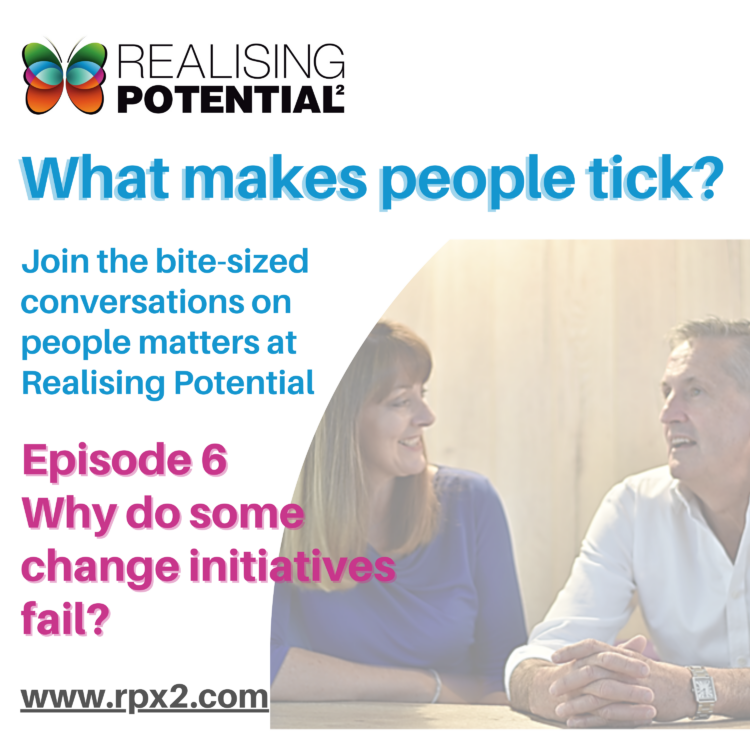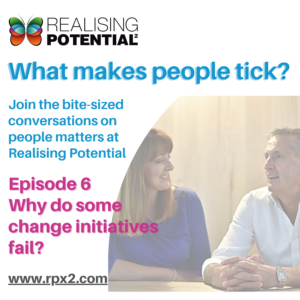
In this latest episode of the ‘Bite-sized conversations – What makes people tick?‘ at Realising Potential the topic of change within organisations takes centre stage. Fiona Brookwell and Michael Jones explore the dynamics of introducing new directions, shedding light on why some individuals embrace it eagerly while others can be seen as resistant to the winds of transformation.
There are individuals inherently drawn to change, possessing a natural affinity for big-picture thinking and out-of-the-box solutions. These individuals thrive on challenging the status quo, seeking innovation and growth at every turn. In contrast, for those who find comfort in familiarity and routine change can be accompanied by apprehension.
Precisely herein lies the complexity of implementing change within organisations. Change initiatives often falter because companies fail to fully recognise the divers needs of their workforce when embarking on a new direction. Some employees may be keen to drive change forward with zeal, others may struggle to adapt, needing time and support to navigate the shifting landscape.
Being aware of these different approaches to change is key for any change initiative to be successful. It enables leaders to provide the necessary empathy, clarity and training to those that are expected to follow them on the journey of transformation – and tailor it accordingly.
By recognising that change is not just about embracing the new but also about preserving the essence of what makes an organisation great, leaders can navigate the seas of transformation with grace and purpose.
How do you handle change at your organisation? Why not tune into “Why do some change initiatives fail?” and unpack the intricacies of navigating change?
At RPX2 Ltd, we are passionate about helping people and companies realise their potential. To explore more about the services discussed in the episode, please visit www.rpx2.com.

If you’d prefer to read a transcript, here is a summary of the conversation:
Neale James: Here’s what’s on today’s edition of Realising Potential with Fiona Brookwell and Michael Jones.
Fiona Brookwell: So, there are certain people that get excited by change. They’re naturally orientated towards big picture, out-of-the-box thinking.
Michael Jones: And the question was asked of him quite recently, the CEO of this organisation, are you doing it because you want people to leave? And he went: ‘Absolutely not’.
Fiona Brookwell: You have to make sure that there are systems, and there are processes, and there are ways of doing things that, you know, help to retain your client base, for example.
Michael Jones: But the reality is if we don’t change, there will be no jobs.
Neale James: Fiona, why can change initiatives struggle to be successful within organisations?
Fiona Brookwell: In our experience, change is not easy for a lot of people. It’s easy for some people, but there’s a whole chunk of people that it’s not so easy for. And again, it comes down to that.
Michael’s mentioned a number of times about superpowers and some people just have superpowers around lots of new initiative, getting bored with what’s gone before, a natural propensity to want to drive change and innovation.
You know, how can we simplify this? How can we make this easier? What about something new, you know, recognising maybe something new hasn’t happened for a long time. So, there are certain people that get excited by change. They’re naturally orientated towards big picture, out-of-the-box thinking, challenging the status quo, trying new and different things, and they get excited by it.
People of that nature, our experience would suggest, they like to simplify and make things happen as quickly as possible. Which is great.
However, organisations are not just manned by people of that nature. In organisations, you have to make sure that there are systems and there are processes and there are ways of doing things that help to retain your client base, for example, keep things safe and secure.
And people who do jobs of that nature and enjoy doing jobs of that nature, so their superpower is to dot the I’s, cross the T’s. Do the routine of things. Make sure the systems are working. People of that nature, um, change is a lot scarier prospect for them. And of course, it’s not that, that these people can’t adapt to change.
They can adapt to change, but these are people that often like to take time to be able to adapt to it. They like the heads up. They need to understand why is the change happening, you know, why is it going to be better? How is it going to impact me? How is it going to impact my work?
They like a lead time to be able to adapt to the change and they need to be trained. They need to be trained on what is this new thing that we’re bringing in, and they need to have time to be able to train and to practice and to become proficient in this new thing.
Because why are they successful at the jobs they’ve been doing so far? Because they’re perfectionists, you know, they know their stuff. They have depth, knowledge and substance. A lot of, for a lot of them, their confidence comes from their knowledge base.
So, if you’re going to change my specialist subject, then you’re going to have to give me time to actually develop new skill so that I can feel as confident in the new as I was in the old. That takes time. It takes process.
The challenge is, is that often people who lead change within organisations, they think everything can happen yesterday, and they don’t think through the process or they’re not interested in the ‘how’ the new thing is going to happen. They just want the new thing to happen.
And if there’s a disconnect, if those that are driving the change, don’t understand the needs of the audience who have to take the change on board, then you can get that disconnect.
So, often those driving change in the world of those that have to take it on board, they are trying to drive too much, too quickly, and we struggle to keep up. And we’re fearful that we’re going to do the wrong thing, and if too much happens too quickly and they become too fearful, then often the people that are trying to take the change on board will get defensive. They’ll often actually get to the stage where they’ll say ‘no stop hold on, enough, too much’ and so these people can often be seen as blockers within change initiatives.
And they’re not purposely, maliciously trying to block the change to stop it happening. If this happens, in our experience, what they’re saying is, ‘Whoa, whoa, whoa, whoa, hold on a minute. I don’t understand. You’re trying to do too much too quickly, and I’m scared that it’s going to go wrong, and I don’t want to be responsible for something going wrong’. So, often this defensiveness and what can come across as defensiveness is often a cry for help.
But if those that are trying to drive and lead the change are not actively listening to what those on the receiving end are actually saying to them, then that’s when you can get that clash. It’s often a struggle.
Michael Jones: I have a story that sort of might put that into some form of context. Working with a client of mine in the education sector, and I think picking up the point that Fiona made about the people that are excited by change. People that are not necessarily excited by change, they like the predictability that comes from a long-term relationship with an organisation, a group of people that they’ve worked with, a boss that they’ve worked with for long periods of time, a team that they very much connect with. And typically, those types of people, if we can generalise to that extent, find organisations where that exists.
So, you tend to find it a lot in traditional, big organisations, in public sector, perhaps. And I’m thinking of an example with a client of mine in the education sector, as I say, where teachers, I know this, are lovely people. You know, they like to come to work, they give their best, they have the best interests of the children at heart, and they like to come to work knowing what they need to do.
They do it very well. They go home to their families, and they tend to be quite energised by the importance of the work-life balance. Recently, a client of mine has been working with a school where there has been a need for significant change because the school is now financially challenged. And if something quick and different isn’t done, it will have a devastating effect.
So, a new leader has come in with that natural orientation to change and is quite frankly upsetting the apple cart. But the reality is, it’s an apple cart that needs to be upset. So, is introducing new ways of doing things, putting additional pressure on people, asking them to step up to the plate really.
And of course, the reality is, the vast majority of people in that organisation are struggling with that approach because it’s different to the way that we’ve always done it. And the question was asked of him quite recently, the CEO of this organisation, are you doing it because you want people to leave?
And he went: ‘Absolutely not. I know I’ve got wonderful people who are technically competent, but because I am asking them to significantly change what they do, some of them will make that decision to leave.’ That particular leader was saying, you know, ‘I don’t want to lose these people because they’re valuable, their experience, their knowledge, they’ve got a huge depth, but the reality is if we don’t change, there will be no jobs. So, if they decide that that’s what’s right for them, I will support them in making that transition.’
Neale James: Realising Potential with Fiona Brookwell and Michael Jones. For more information about our services and our organisation visit www.rpx2.com
Please visit us on Buzzsprout to find all other episodes in this series.